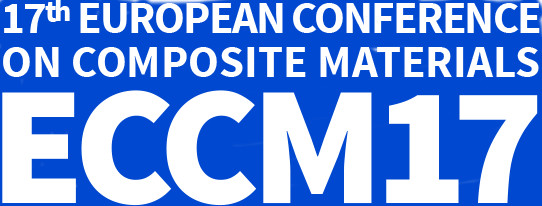

App-Einstellungen:
EFFECTS OF DIFFERENTLY IMPREGNATED CARBON FIBER REINFORCED TAPES WITH POLYAMIDE 6 ON FURTHER PROCESSING
Veronika Radlmaier (Technical University of Munich / Institute for Carbon Composites) H. Baumann (Technical University of Munich / Institute for Carbon Composites) Patrik-Vincent Brudzinski (SGL Technologies ) Andreas Erber (SGL Technologies ) Hannes Koerber (Technical University of Munich / Institute for Carbon Composites) Klaus Drechsler (Technical University of Munich / Institute for Carbon Composites)
This study aims to investigate if partially impregnated tapes can be completely impregnated throughout a typical production process for thermoplastic composite components.
EVALUATION OF THE IMPREGNATION CHARACTERISTICS OF CARBON FIBER-REINFORCED COMPOSITES USING POLYPROPYLENE GEL-FILM.
Soo Jin Ham (Chonbuk National University) Seung A Song (Chonbuk National University) Seong Su Kim (Chonbuk National University)
In this study, we fabricated CFRPP by using a high speed resin transfer molding (RTM) with PP gel-film whose flow direction is through-thickness for the preform to solve the low impregnating property of the CFRPP.
EXPERIMENTAL INVESTIGATION OF THE RADIUS FORMING BEHAVIOR OF FIBER REINFORCED THERMOPLASTICS
Alexander Schug (Fraunhofer ICT) Roland Hinterhölzl (Technical University of Munich / Institute for Carbon Composites) Klaus Drechsler (Technical University of Munich / Institute for Carbon Composites)
The following work focuses on the experimental analysis of the forming behavior of fiber reinforced thermoplastic layups with a special focus on the radii. Possible factors influencing the result and quality of the forming shall be investigated.
FLOW BEHAVIOR OF COMPLEX SHAPED HYBRID CFRTP DURING COMPRESSION MOLDING
Daiki Kobayashi (University of Tokyo) Yi Wan (University of Tokyo) Hanchul Lee (University of Tokyo) Taro Nakamura (University of Tokyo) Haowen Wei (University of Tokyo) Jun Takahashi (University of Tokyo) Isamu Ohsawa (University of Tokyo)
The flowability of hybrid CFRTP was investigated by using rib formation mold. The fiber distribution of the plate part under the charging port of ribs was relatively kept successfully and the flexural rigidity was improved by hybridization.
HYBRID TEXTILES – THE OTHER WAY OF FORMING HIGH-PERFORMANCE THERMOPLASTIC COMPOSITES FOR PRIMARY STRUCTURE
Maximilian Koerdt (Faserinstitut Bremen) Patrick Schiebel (Faserinstitut Bremen) Oliver Focke (Faserinstitut Bremen) Axel S. Herrmann (Faserinstitut Bremen)
Thermoforming of endless-fibre reinforced peek from hybrid textiles incl. analysis of hybrid yarns and resulting part quality, influenced by fibre orientation and consolidation parameters. Concluding processing of an overmoulding step is illustrated.
HYBRID WELDING OF CARBON-FIBRE REINFORCED EPOXY BASED COMPOSITES
Francesca Lionetto (University of Salento) Silvio Pappadà (Consorzio CETMA, Departments of Materials and Structures Engineering) Giuseppe Buccoliero (CETMA) Maria Nicolas Morillas (Delft University of Technology) Irene Fernandez Villegas (Delft University of Technology) Alfonso Maffezzoli (University of Salento)
A new approach for the assembly of thermosetting composites by induction and ultrasonic welding was developed. A proper modification of the composite layup with a thermoplastic film in the stacking sequence of Carbon fabric/epoxy prepreg was proposed.
IMPROVING THE PROCESSING PROPERTIES OF HYBRID COMPONENTS USING INTERLOCKING EFFECTS ON SUPPORTING STRUCTURES
Jan Beuscher (Technische Universität Braunschweig, Institut für Werkzeugmaschinen und Fertigungstechnik) Michael Brand (Technical University of Braunschweig) Raphael Schnurr (Technical University of Braunschweig) Anke Müller (Technical University of Braunschweig) Markus Kühn (Technische Universität Braunschweig) Franz Dietrich (Technical University of Braunschweig) Klaus Dröder (Institute of Machine Tools and Production Technology)
Multi-material design effects automation and process challenges because of differing processing properties of materials. This paper introduces a proposal for improving processing properties using interlocking effects between different materials.
INFLUENCE OF MAXIMUM TEMPERATURE AND COOLING PHASE ON THE LAP SHEAR STRENGTH OF INDUCTION JOINED GLASS FIBER REINFORCED THERMOPLASTICS AND STEEL
Martina Hümbert (Institute for Composite Materials) Peter Mitschang (Institute for Composite Materials)
This study investigates the influence of joining temeprature and the temperature range during which pressure is applied on the joint strength of glas fiber reinforced thermoplastics and steel joined by induction joining.
INTRINSIC MANUFACTURE AND DESIGN OF POSITIVE LOCKING FIBRE REINFORCED THERMOPLASTIC/METAL HOLLOW STRUCTURES
Daniel Barfuss (Technical University of Dresden) Raik Grützner (Fraunhofer IWU) Christian Garthaus (Technical University of Dresden) Maik Gude (Technical University of Dresden)
An efficient and intrinsic manufacturing approach for hollow fibre reinforced thermoplastic profiles with multi-scale structured metallic load introduction elements has been developed.
LASER HEAT CONDUCTION WELDING OF INLINE CLEANED ENDLESS CARBON FIBRE REINFORCED THERMOPLASTICS
Verena Wippo (Laser Zentrum Hannover e.V.) Jörg Ihde (Fraunhofer IFAM) Peter Jäschke (Laser Zentrum Hannover e.V.) T. Wuebben (Fraunhofer IFAM) Peter Linde (Airbus Operations) Oliver Suttmann (Laser Zentrum Hannover e.V.) L. Overmeyer (Laser Zentrum Hannover e.V.)
Laser transmission welding was transferred to heat conduction welding for joining endless carbon fiber reinforced thermoplastics. The influence of surface contaminations and the effect of the removal technique on the lap shear strength were studied.
